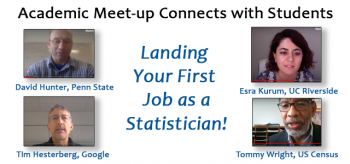
Over the lunch hour on Wednesday, October 10, Mimi Kim, Head of the Division of Biostatistics at the Albert Einstein College of Medicine and NISS Board member presided as moderator for four accomplished statisticians from the private sector, academia and government. The topic up for discussion was the advice and suggestions that these folks could provide to graduate students in the process of, or thinking about landing their first job as a statistician. Each speaker talked about their hiring process, the qualities and skills they look for in candidates, and the do's and don’ts during the interview. In all, more than 80 people from at least 25 universities attended this virtual meet-up.
The speakers and their words of advice
Tim Hesterberg, statistician at Google and NISS Board member, was the first speaker and after sharing his wide range of experience, he mentioned that at Google, “we would love to see more people who know how to run experiments.” He threw in a plug for the importance of having an understanding of bootstrapping and permutation tests – resampling in general – because, “they are very important in statistical practice.” In the work that Tim is involved in, the formulaic approach is too slow – this method using robust estimates is faster and more accurate.
Question: In academia, you are evaluated by the number of published papers or grants – how are you evaluated in industry? Tim’s response: There are self-evaluations, evaluation from supervisors and also peer reviews based on the work that has been done with other employees of Google. These peer reviews are important which means that it is important to be able to successfully collaborate with others.
David Hunter, past Department Head of the Department of Statistics at Penn State was the next speaker. Whereas Tim was able to share his experiences in industry, David focused his remarks for those considering positions in academia. David cited himself as an example of “who knows where you career path will take you!” He started teaching high school math and from there his path took him to Penn State where he is beginning his 20th year. His advice centered on three points: 1) strong teaching experience is good, 2) do interesting work and 3) sell yourself.
David stated, “Communication is important no matter where you go. I cannot think of a job in statistics today that does not involve communication with other people.”
He demonstrated his second point by distinguishing between two hypothetical candidates, one that predominantly had a very strong publication record, and another with a wide range of work that demonstrated experience with software, collaborative work with other scientists involved in solving real applied problems. He suggested that the field is moving more towards the latter, i.e., junior faculty that want to have an impact on the world, that will represent the statistics of the future, and that can communicate and present well.
Esra Kurum, assistant professor at the University of California, Riverside was next. She shared with the audience her perspectives about doing a postdoc after getting her Ph.D. Esra pointed out the advantages she saw of doing a Postdoc, i.e., a chance to publish your dissertation, few teaching and/or administrative responsibilities, and a chance to work on grants. But more importantly she found the opportunities to collaborate more with interdisciplinary groups and network with other scientists. Much of what she learned during this time she was able to use when she applied for her current academic position.
The final speaker was Tommy Wright, senior statistician at the United State Census Bureau and NISS board member, who is clearly “still extremely fascinated” with the work he has and is currently involved in. He finds it very appealing that the work of his office is defined in the Constitution of the United States, that the idea of democracy is based on representation and his Bureau’s goal is trying to make inferences about the larger population based on a sampling from the population – clearly something that is very important. Besides echoing the points made by the previous speakers, Tommy reiterated the importance of communication based on years of interacting and mentoring colleagues; “Behave so that you would want to hire yourself.”
“The best way to get to the next job is to do extremely well at the job that you currently have. Approach each position as though it is your last. Do this and people will come looking for you! ”
Tommy Wright, US Census Bureau
NISS plans to hold the second virtual academic meet-up to discuss “Strategies for Career Advancement in Academia” sometime later this winter. Check upcoming issues of the NISS Parameters newsletter for connection information along with a list of speakers. This information will also be published on the NISS website.
